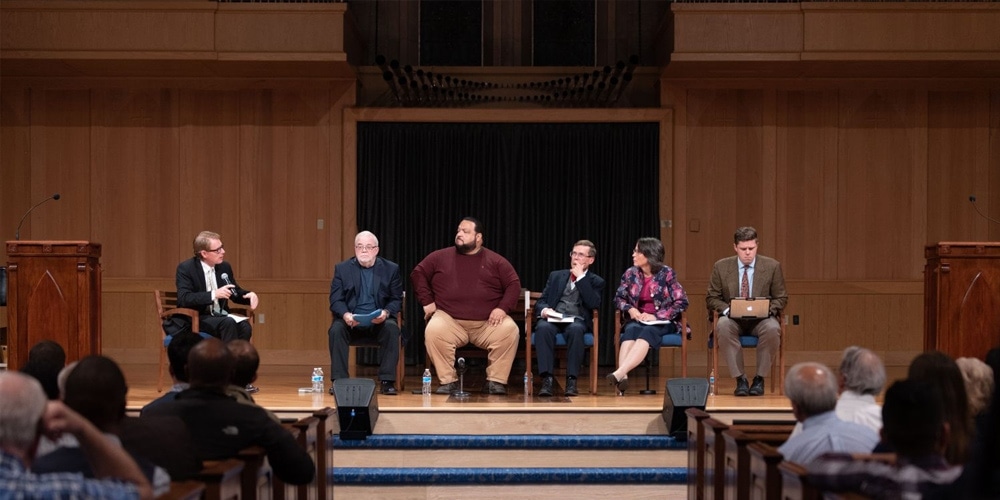
The Seventh-day Adventist Theological Seminary at Andrews University and the Lake Union Conference partnered recently to produce a scholarly conference entitled “Jesus and Politics: Christians, Liberty, and Justice Today” on the university’s campus in Berrien Springs, Michigan, United States.
More than 100 people registered to attend the event held October 17-19, 2019, some coming from as far away as California, Canada, and Africa. Several hundred Andrews University students also participated.
Organizers said the focus of the conference was to discuss how Jesus, in His time on earth, served the less fortunate, and how Seventh-day Adventists must help others even while avoiding involvement in partisan politics. Plenary speakers talked about the need for speaking out on issues, and panelists provided examples of how to help in different key areas of need.
Race as a Religious Issue
The first plenary session was open to the public and held at the Pioneer Memorial Church with a good turnout. Jim Wallis, founder, president, and editor-in-chief of Sojourners magazine, spoke about topics in his new book Christ in Crisis: Why We Need to Reclaim Jesus. Wallis told his own faith story of growing up in Detroit and the differences between white and black in his hometown.
“When I was young, I was told that race was not a religious issue but a political issue and shouldn’t be discussed,” Wallis said. “So I left the church and worked on these issues, to later return.”
Wallis emphasized that our religion should shape our politics, but our politics shouldn’t shape our religion. “The Bible has 2,000 references to the poor, and if we cut them out, the Bible is full of holes,” he said. Wallis also touched on the issues of mass incarceration, migrants and refugees, voter suppression based on race, and the need for the truth.
The Gospel and Civil Rights Together
On Friday, plenaries continued in the Seminary Chapel with a presentation by David Trim, the Adventist Church’s director of Archives, Statistics, and Research (ASTR), who spoke of early Adventist missionaries and their heritage of social and human rights involvement. “They would not only bring the Word of God but would also teach the people trades and how to stand up to oppression,” Trim shared.
The conference partnered with Pioneer Memorial Church and One Place, both on the campus of Andrews University, to supply speakers during their services on Saturday (Sabbath). Edward Woods III (who read a sermon by Calvin Rock), Alvin Kibble, Ganoune Diop, and Claudia Allen preached at those venues.
Afternoon presenters included Michael Nixon, vice president for diversity and inclusion at Andrews University, who communicated that we are replaceable.
“As Adventists, we tend to eschew collaboration, but we need Christians from the outside, who are truly doing the work of anti-racism, to come in and show us the way, because we are not doing it,” Nixon said. He encouraged everyone to “wake up, let the façade die, and be born again.”
The Two Horns of the Lamb-like Beast
Nicholas Miller, professor of church history at the Seminary and Public Affairs and Religious Liberty (PARL) director at the Lake Union Conference, talked about the lamb-like beast having two horns — religious freedom and republicanism (a system of government based on equality and checks and balances).
“Adventism can be quick to defend religious freedom but slow to respond about the other horn,” Miller said. “Our Adventist founders were not silent on social issues, yet the Adventist Church supported Hitler because he didn’t raise red flags about religious freedom for us.”
Miller also explained that many white members of the Adventist Church didn’t get involved in the United States civil rights movement because it was viewed as a political movement.
“How much better it would have been to see these issues for what they were in the present time than for the Adventist Church to have had to issue apologies years later (as they have),” Miller said.
Thought-Provoking Panel Discussions
Breakout sessions included panels on topics such as “Jesus and the Me-Too Movement,” “Jesus Among the Social Issue Activists,” “Jesus Among the Migrants and Refugees,” and “Jesus Among the Religious Liberty Advocates,” among others. These panels supplied practical information, including actions that attendees could take to make a difference in their area of influence. Organizers shared that several attendants confessed they are planning to make some changes immediately based on what they had heard.
The weekend concluded with the concert “With Liberty and Justice For All,” featuring music by the Andrews University Wind Symphony, directed by Byron Graves, and readings on the topic of the major events in the history of the United States where liberty and justice were fought for or forgotten. These included historical events such as the Trail of Tears (the forced relocation of Native tribes), the American Civil War, and the events of September 11, 2001, as well as celebrations of religious freedom and civil rights.
The original version of this story was posted on the Lake Union Conference news site.